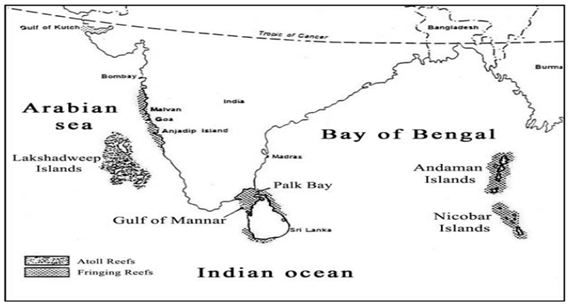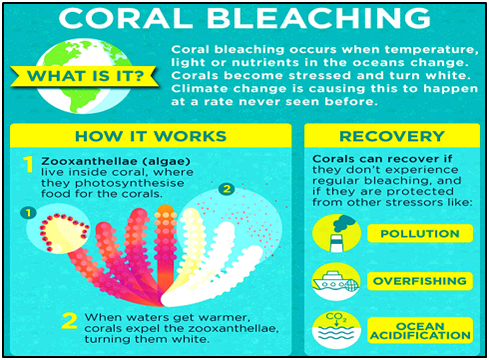Why in News?
- According to the U.S. NOAA, the world is on the verge of a fourth mass coral bleaching event which could see wide swathes of tropical reefs die, including parts of Australia's Great Barrier Reef.
What’s in Today’s Article?
- What are Corals and Coral Reefs?
- What is Coral Bleaching and Why is it a Cause for Concern?
- What are the Findings of the National Oceanic and Atmospheric Administration (NOAA)?
What are Corals and Coral Reefs?
- Corals are animals (polyps), which live in a symbiotic relationship with tiny algae called zooxanthellae.
- These algae provide the corals with food and oxygen, and in return, the corals provide them with a safe place to live.
- Coral reefs are limestone structures formed by thousands of tiny coral animals and are found in tropical climates.
- Major coral reefs in India:

What is Coral Bleaching and Why is it a Cause for Concern?

- When corals are exposed to stressful conditions, such as high temperatures, pollution, or changes in the water’s chemistry, they expel the zooxanthellae.
- Without them, the coral loses its color and turns white, hence the term “bleaching.” Corals cannot live very long in this state.
- Coral bleaching doesn’t necessarily mean the end of the reef. If the stressor is removed in time, the zooxanthellae can come back and the corals can recover.
- Coral reefs provide a home and a source of food for countless species of fish and other marine creatures.
- They also protect coastlines from erosion and storms, and play a vital role in regulating the Earth’s climate by absorbing and storing carbon dioxide.
- Additionally, coral reefs are a stunning display of biodiversity and natural beauty, and their loss would be a tragedy for future generations.
- When coral reefs suffer, so do the ecosystems and the people that depend on them.
What are the Findings of the National Oceanic and Atmospheric Administration (NOAA)?
- The world is on the verge of a fourth mass coral bleaching event (after 1998, 2010 and 2014).
- For an event to be deemed global, widespread bleaching must occur in three ocean basins - the Atlantic, Pacific and Indian.
- The last global mass coral bleaching event ran from 2014 to 2017, during which time the Great Barrier Reef lost nearly a third of its corals.
- Preliminary results suggest that about 15% of the world's reefs saw large coral die-offs in this event.
- This year is turning out to be even worse. For example, following the Northern Hemisphere summer last year, the Caribbean registered its worst coral bleaching on record.
- Coral bleaching is often tied to the naturally occurring El Nino climate phenomenon which leads to warmer ocean waters.
- The world also just registered (as a result of climate change) its first 12-month period with an average temperature over 1.5 degrees Celsius (2.7 degrees Fahrenheit) above pre industrial levels.
- A rise of 1.5C is believed to be the tipping point for mass coral die-offs, with scientists estimating that 90% of the world's corals could be lost.










